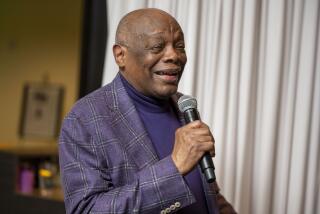E. Richard ‘Rick’ Brown dies at 70; pioneer in study of public health
- Share via
E. Richard “Rick” Brown, the founding director of the UCLA Center for Health Policy Research who pioneered the collection and wide dissemination of health survey data to influence public policy and was a leading advocate for healthcare reform, has died. He was 70.
Brown, who lived in Santa Monica, died April 20 in a hospital in Lexington, Ky., where he suffered a stroke after moderating a panel at a conference on health communication, said his wife, Marianne Parker Brown.
A professor in the Department of Health Services at the UCLA Fielding School of Public Health, Brown founded the UCLA Center for Health Policy Research in 1994.
One of the center’s major activities has been the development of the California Health Interview Survey, the premier source of information about individual and household health status in California. It has served as a model for health surveys for other states.
Brown was the founder and principal investigator for the survey, which produced its first data from interviews with more than 55,000 California households in 2001. Information from the survey, which has been conducted every two years, has been used by policymakers, community advocates, researchers and others.
“The single thing that makes Rick stand out in this field is that he had an extraordinary capacity to use evidence about the public’s health and strategize and advocate to turn that evidence into the best policy and action,” said Dr. Linda Rosenstock, dean of the UCLA Fielding School of Public Health.
Former state Sen. Sheila Kuehl (D-Santa Monica), who chaired the state Senate Health Committee for two years, said Brown “cared deeply about those who were uninsured.”
“The way he chose to address it is he thought if you just developed responsible and accurate health data, you could counter persistent myths about the uninsured and also connect the fact of being uninsured with harsh health consequences, such as a shorter life span and having more serious illnesses because you didn’t test to be diagnosed early,” Kuehl said.
Data provided by the California Health Interview Survey “was the first time we had that kind of information just on our residents in California,” Kuehl said. “Before that, you got a lot of information, but it was aggregated nationally. We had little data to help us legislate in California.”
The data developed by the center “became one of the important ways that we argued for universal healthcare,” she said.
Gerald Kominski took over as director of the UCLA Center for Health Policy Research in January after Brown stepped down, but Brown remained principal investigator of the survey.
In 1990, Brown was co-author of California’s first single-payer healthcare legislation. He also co-wrote several other healthcare reform bills over the last two decades.
A past president of the American Public Health Assn., he served on dozens of health advisory committee and boards.
He also was a full-time senior consultant to President Clinton’s Task Force on National Health Care Reform and served as a senior health policy advisor for the Barack Obama for President Campaign — as well as serving as an advisor to U.S. Sens. Bob Kerrey, Paul Wellstone and Al Franken.
The son of eastern European immigrants, Brown was born Feb. 17, 1942, in Plainfield, N.J., and moved to the Los Angeles area at an early age.
His father was a union organizer and social justice activist and times were tough for the family, which lived for several months in a tent behind a family friend’s restaurant. After his parents separated when he was 12, Brown and his brother were raised by their mother, a bookkeeper.
Brown’s interest in studying public health and finding ways to improve health coverage for all had its roots in an early experience when his brother required medical care after running his bicycle into a tree.
“My mother always remembered the stigma she felt when the eligibility workers at the county hospital grilled her about her income and were very demeaning to her because she couldn’t pay the medical bills,” he recalled.
Brown received a bachelor’s degree in sociology, a master’s in education and a doctorate in sociology of education from UC Berkeley, where he taught for about five years in the 1970s.
In addition to his wife of 46 years, Brown is survived by his daughters, Delia Brown and Adrienne Faxio; his brother, Julian Horowitz; and a granddaughter.
More to Read
Sign up for Essential California
The most important California stories and recommendations in your inbox every morning.
You may occasionally receive promotional content from the Los Angeles Times.













